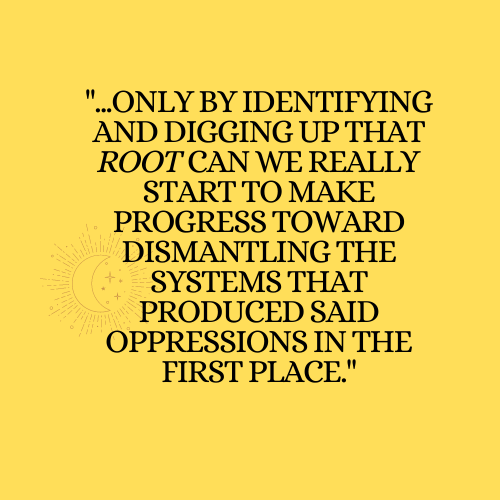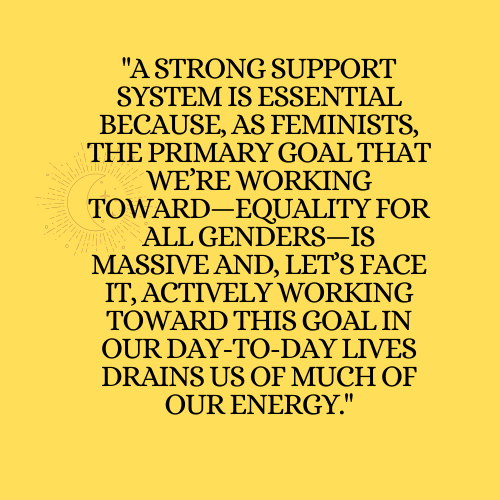Everyday Activism is Key
It really is.
And I don’t necessarily mean the type of activism that usually comes to mind when we think of, well, activism. Personally, when I think of activism, the first thing that pops into my head is a group of people marching down the street—or maybe standing outside a government building or courthouse—with their picket signs reading clever things like “if I wanted your opinion on what I should do with my reproductive system, I would have asked for it!”
This type of activism is necessary and noble and I admire anyone who has enough lady balls to go out and do it, but there are additional measures we can implement in our everyday lives that will, perhaps, help us get to the point where we are willing—even excited—to head out to the streets with those picket signs.
What follows is only a few suggestions: a mere scraping-of-the-surface of everyday acts of feminist activism.
1. Read, Always
Read as much as you can and as often as you can, even if this means simply sitting down and reading for fifteen minutes a day.

The fact of the matter is, there is a history of oppressions—of individuals being discriminated against and pushed to the social sidelines because of their gender, their race or ethnic background, their sexual orientation—that can only really be read about in books. We still obviously witness discriminatory acts in our day-to-day lives and I’m sure that many of us have experienced discrimination ourselves, but picking up a book and reading about the fight for the woman’s right to vote, the horrors of slavery, and the reality of war allows us to see the systemic underpinnings of contemporary issues: the root causes of the oppressions.
And only by identifying and digging up that root can we really start to make progress toward dismantling the systems that produced said oppressions in the first place.
It will get dirty.
It will get uncomfortable.
It will make some of us want to put down that book and never pick it up again, but it’s important that we do pick that book up again and continue reading.
2. Be a Teacher
If you’ve been doing your reading and you happen to enter a conversation with another individual who is wrong about a certain historical fact—for instance, an individual states that women have had the right to vote in Canada since it became a country in the mid-to-late 1800s, but you know full-well that women did not even begin to gain the right to vote in Canada until the first world war was coming to an end between 1917 and 1918—don’t be afraid to correct them.
It’s your duty to correct them.
Someone will correct them eventually, so why can’t that someone be you?
It’s also quite possible that we will encounter people that need to be told directly when they are using offensive language, when they are being close-minded, when they are straight-up being misogynistic, homophobic, racist.
I actually encountered this situation while I was a teaching assistant during my second year of graduate school. I had a student who—during class—basically stated that racism was not a real issue anymore and that it doesn’t need to be discussed in the classroom. I pulled him aside after class and told him why his comments were problematic.
This was extremely difficult for me because, to be honest, I hate confrontation. I try to avoid it whenever possible, but this was a teaching opportunity that I could not ignore.
3. Be a Student
Most women—if not all women—will likely experience discrimination, loss of opportunity, harassment, or even assault during her lifetime simply due to the fact that she identifies as a woman.
This is a harsh truth, but one that we are working constantly toward rectifying.
There are also women, however, who—alongside sexism—will likely experience racial discrimination, religious discrimination, discrimination because of their sexual orientation and/or sexual preferences.
The list goes on.
And on.
Rather than being the teacher in this scenario, we need to be the students. Many of us will never experience these types of intersectional oppressions, so we need to sit back and listen to other women who have, in fact, had these experiences and encourage them to share their stories.
I explore this topic in some depth in my blog post “(Intersectional) Feminism.”
4. Create a Feminist Network
It is absolutely imperative that we surround ourselves with individuals who support us not only in our feminist journeys but in life, as well. For instance, although many of the friendships I made in graduate school began because we were all writing about similar themes of marginalization and oppression in our theses, the friendships have continued because these women—my friends—have also continued to support me in all other aspects of my life: the relationships I’ve chosen to pursue, my work-related decisions, my personal and creative projects.

A strong support system is essential because, as feminists, the primary goal that we’re working toward—equality for all genders—is massive and, let’s face it, actively working toward this goal in our day-to-day lives drains us of much of our energy.
What’s the best way to recharge our energy?
I think it is to surround ourselves with individuals who are supportive of our goals, understanding of our goals, and maybe even share the same goals.
We feed off other individuals’ energy, so it’s ideal to surround ourselves with as much positive energy as possible. The last thing we need in our lives is an individual who is just there to make things even more difficult and further drain the energy that could be spent more productively.
5. Write Your Heart Out
Yes, this is a bit biased of me to include since writing is my current avenue of resistance to patriarchal ideals but believe me when I say: it works.
And I’m not just talking about sitting down and writing a blog post, either.
I’m talking about any and all kinds of writing.
If you encounter something that breaks your little feminist heart—harassment in the workplace, discrimination at a local shop, an assault on the street—write a letter to your local, provincial, or federal government about the sexism and violence that continues to haunt their systems; write a full-on novel about the wrong-doings you’ve witnessed or experienced yourself; write a song about the glaring issues that are sitting on the surface but others are refusing to recognize (“Only Women Bleed” and “Love the Way You Lie” were surely hand-written on the back of a napkin or menu at some point, I’m sure).
Finally, write that clever thing on that picket sign and take it to the streets.